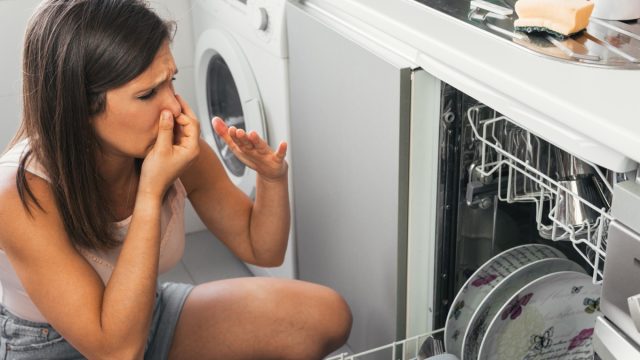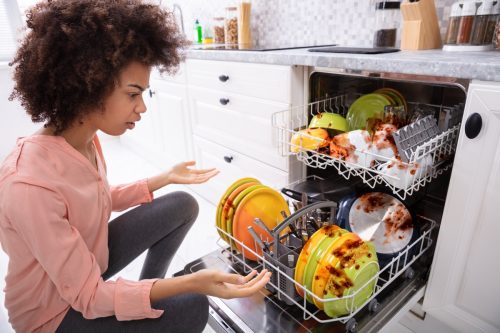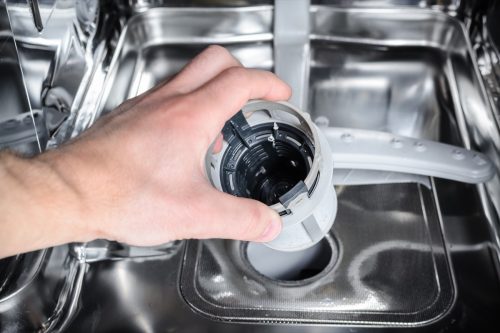What Happens If You Never Clean Your Dishwasher, According to Experts
Contrary to popular belief, it's not actually self-cleaning.

If you've ever lived without a dishwasher, then you know how life-changing these appliances can be—especially after hosting a party or a holiday meal that involved a lot of dirty dishes piling up. Stack them in the dishwasher, push a button, and voilà! You can relax while it does the work for you. But did you know that this hardworking kitchen appliance requires a little cleaning itself?
"It's funny how we think to clean our ovens or polish our sinks, but the dishwasher often falls by the wayside," says Matt Hagens, a general contractor and the founder of Mr. Kitchen Faucets. "I mean, it's a machine that cleans, so it should clean itself, right? Unfortunately, that's not the case. Dishwashers aren't self-cleaning wizards, as much as we might wish they were. After years working as a contractor, I've seen the grimy truth, and believe me, it's not a pretty sight."
In fact, not cleaning your dishwasher can actually put your health at risk. Read on to find out why—and how experts say to keep it in tip-top shape so it not only gets your dishes sparkling, but keeps you safe from harm.
READ THIS NEXT: If You're Using Any of These "Unsafe" Cleaning Products, Stop Now, FDA Warns.
Your dishwasher may not work as well.

"Like any appliance, dishwashers need regular maintenance to function effectively and safely," says Andrew Brown, a NASTeC-certified appliance repair technician. "If not cleaned regularly, a dishwasher is open to several problems that not only affect its performance but can also pose hygiene and health risks."
The biggest issue here is the filter, Brown explains. "Dishwashers have filters to catch larger food particles that don't get rinsed off dishes. If these filters aren't cleaned regularly, they can become clogged, causing the dishwasher to not drain properly or clean dishes as effectively. Long-term neglect of dishwasher cleaning can lead to more serious issues like damage to the pump or spray arms."
READ THIS NEXT: What Happens When You Don't Wash Your Sheets Every Week, Doctors Say.
You could put yourself at risk of foodborne illness.

"If your dishwasher isn't cleaning your dishes properly due to neglect, you could be at risk for foodborne illnesses. This is especially true if you're using the same plates for raw and cooked foods," says Brown. "Food particles that remain in a dishwasher can create a breeding ground for bacteria and mold. These microorganisms can then be sprayed onto your dishes during the wash cycle."
An unpleasant odor from your dishwasher may be the first clue that your dishes aren't getting squeaky-clean—and that your health could be on the line. "I recall a client who had never once cleaned their dishwasher," Hagens tells Best Life. "They started noticing an odd smell and less-than-clean dishes. To cut a long story short, we discovered a clog that had become a haven for some rather unpleasant organisms. A thorough cleaning later, the smell was gone, and their dishes were back to their sparkling best."
You may have an allergic reaction.

Tim Jankowski, president of Aladdin's Cleaning & Restoration, says one of the biggest hazards of not cleaning your dishwasher is the buildup of mold. "Mold spores can easily impact you if you have allergies or asthma, and there is a potential for even more dangerous health implications from mold," he tells Best Life. "Mold will grow from a combination of the dark interior of the dishwasher, moisture buildup, and the leftover food particles from the dishes."
"Mold and mildew can cause allergic reactions in some people," Brown confirms. "If these fungi are present in your dishwasher, they could potentially cause health issues."
For more health news sent directly to your inbox, sign up for our daily newsletter.
Here's how—and how often—to clean your dishwasher.

While you're probably not eager to add yet another chore to your to-do list, cleaning your dishwasher is a non-negotiable—and not that difficult. "A little maintenance can go a long way in keeping your dishwasher, and by extension your dishes, pristine and safe," says Hagens.
He recommends thoroughly cleaning your dishwasher once a month to minimize the accumulation of germs, food debris, and hard water deposits. "Stick to the manufacturer's guidelines, make it a point to clear the drain and food trap weekly, and consider using vinegar and baking soda as a natural, budget-friendly cleaning solution," he advises.
"If you forget to clean your dishwasher filter regularly, it's like hosting a party and not cleaning up afterward. Imagine the mess!" says home organizing expert Sarah Clemence, founder of Busy Blooming Joy. She offers her technique for cleaning that filter: "Pop it out, give it a warm bath with some dish soap, and gently scrub it with an old toothbrush or sponge. If you want to keep it fresh as a daisy, a vinegar rinse and a sprinkle of baking soda between cleanings will do the trick."
Best Life offers the most up-to-date information from top experts, new research, and health agencies, but our content is not meant to be a substitute for professional guidance. If you have health questions or concerns, always consult your healthcare provider directly.





















